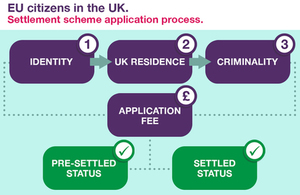Settlement scheme will open in a phased way from later this year and will be fully open by 30 March 2019
The Home Office on Thursday published further details of the post-Brexit settlement scheme for EU citizens.

The settlement scheme will open in a phased way from later this year and will be fully open by 30 March 2019. The deadline for applications will be 30 June 2021.
Immigration minister Caroline Nokes told the Commons on Thursday: "I am … delighted to be publishing today further details about the EU settlement scheme. This will provide the basis for EU citizens resident here, and their family members, to obtain their new UK immigration status, consistent with the draft withdrawal agreement. I will place in the Library of the House a statement of intent setting out in detail how the scheme will work, and how simple and straightforward it will be. The document includes a draft of the immigration rules for the scheme.
"We will engage with our stakeholders on the details set out in the statement of intent. These include the user groups that we have established to help us develop the scheme, involving EU citizens' representatives, embassies, employers and others. We look forward to hearing their views, and will make improvements where we can.
"It will be straightforward for EU citizens residing in the UK to obtain status. If they have lived here continuously for five years, they will be eligible for settled status. Those who have lived here for less than five years will generally be granted pre-settled status and be able to apply for settled status once they reach the five-year point. Applicants will not need to show that they meet other detailed requirements of current free movement rules. This means, for example, that stay-at-home parents, retired people and students can all be eligible."
According to the Home Office, Nokes confirmed that those applying under the scheme will need to complete 3 key steps. They will need to prove their identity, show that that they live in the UK, and declare that they have no serious criminal convictions.
Nokes also announced that the planned fee for people applying under the scheme will be £65 for an adult and £32.50 for a child under 16. For those who already have valid permanent residence or indefinite leave to remain documentation, they will be able to exchange it for settled status for free.
The Home Office says the new online application system will be accessible through phones, tablets, laptops and computers.
Adrienne Yong, lecturer at The University of London City Law School, published a handy explainer of the settlement scheme on The Conversation website here.
Yong says there are a number of issues that still haven't been addressed, including the status of "Zambrano" carers and the fact that settlement scheme's provisions on criminality checks do not currently comply with EU case law applying Article 28, Directive 2004/38.
In addition, Young says protection from deportation is another missing piece of the puzzle: "What this means is that despite having settled status, EU citizens could still be deported."
Writing in The Guardian, Tanja Bueltmann, an EU citizen and a professor at Northumbria University, said the settlement plan does nothing to reassure EU citizens.
While Bueltmann welcomed a number of positives in the Home Office document, she said: "Unfortunately, the clarity on some issues sits against a backdrop that is muddy and couched in vague language and timelines. In the end, the vast majority of our concerns, set out in the 150 unsettled questions by campaign group, the3million, remain unanswered."
Bueltmann continued: "But the main concern relates to the draft immigration rules. Described as 'necessarily technical', the plan is to implement settled status largely through secondary legislation. This type of legislation does not require the involvement of parliament, and so can be changed very easily. EU citizens, our lives forever reliant on the mood of future governments and the Home Office."